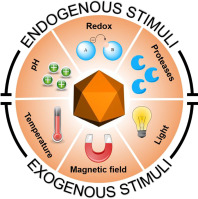Journal of Controlled Release ( IF 10.5 ) Pub Date : 2017-08-24 , DOI: 10.1016/j.jconrel.2017.08.021 Mitchell J Brun 1 , Eric J Gomez 2 , Junghae Suh 3

|
Virus-based therapies have gained momentum as the next generation of treatments for a variety of serious diseases. In order to make these therapies more controllable, stimulus-responsive viral vectors capable of sensing and responding to specific environmental inputs are currently being developed. A number of viruses naturally respond to endogenous stimuli, such as pH, redox, and proteases, which are present at different concentrations in diseases and at different organ and organelle sites. Additionally, rather than relying on natural viral properties, efforts are underway to engineer viruses to respond to endogenous stimuli in new ways as well as to exogenous stimuli, such as temperature, magnetic field, and optical light. Viruses with stimulus-responsive capabilities, either nature-evolved or human-engineered, will be reviewed to capture the current state of the field. Stimulus-responsive viral vector design considerations as well as gaps in current research efforts will be identified.
中文翻译:

用于控制递送治疗的刺激响应病毒载体
基于病毒的疗法作为治疗多种严重疾病的下一代疗法已获得发展势头。为了使这些疗法更加可控,目前正在开发能够感知和响应特定环境输入的刺激响应性病毒载体。许多病毒会对内源性刺激产生自然反应,例如 pH、氧化还原和蛋白酶,这些刺激在疾病中以及不同的器官和细胞器部位以不同的浓度存在。此外,人们正在努力改造病毒,使其以新的方式响应内源性刺激以及外源性刺激,例如温度、磁场和光,而不是依赖病毒的天然特性。具有刺激响应能力的病毒,无论是自然进化的还是人类工程的,都将受到审查,以了解该领域的当前状态。将确定刺激响应病毒载体设计考虑因素以及当前研究工作的差距。











































 京公网安备 11010802027423号
京公网安备 11010802027423号